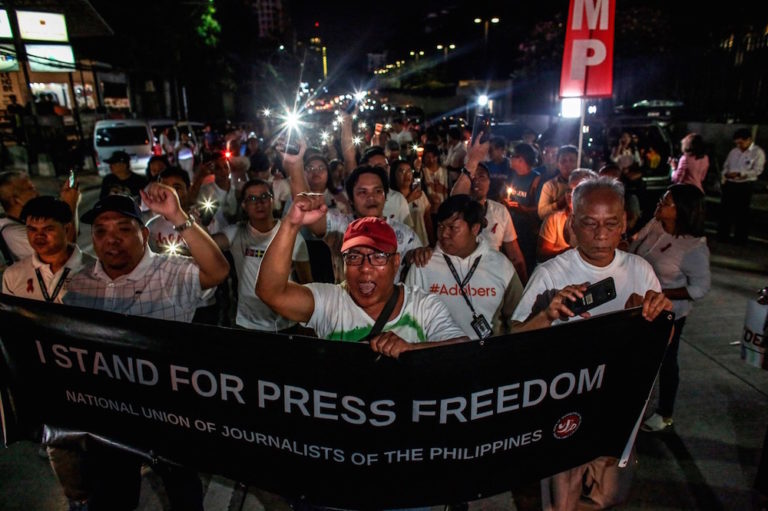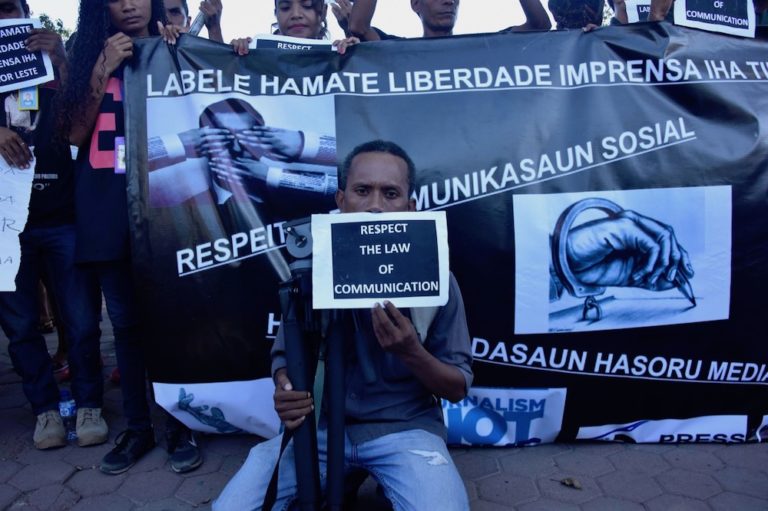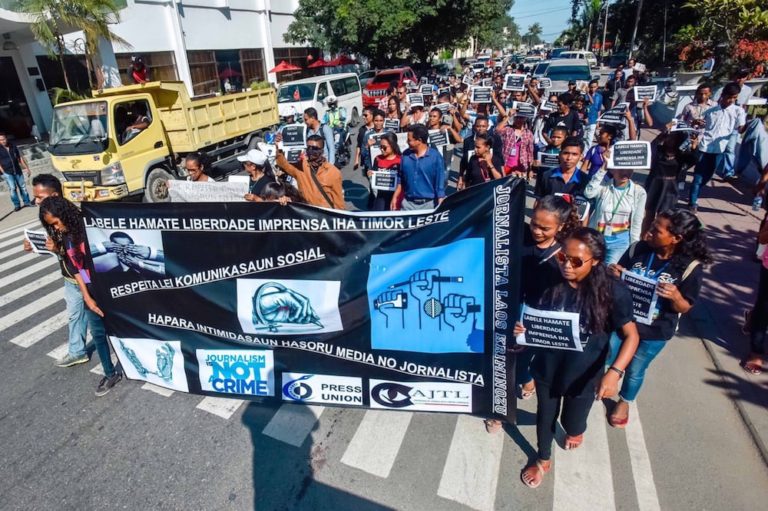(IPI/IFEX) – The following is a 10 March 2006 IPI letter to UN Secretary General Kofi Annan: H. E. Kofi Annan Secretary-General United Nations New York, NY 10017 USA Fax: +1-212-963 48 79 Vienna, 10 March 2006 Your Excellency, The International Press Institute (IPI), the global network of editors, leading journalists and media executives in […]
(IPI/IFEX) – The following is a 10 March 2006 IPI letter to UN Secretary General Kofi Annan:
H. E. Kofi Annan
Secretary-General
United Nations
New York, NY 10017
USA
Fax: +1-212-963 48 79
Vienna, 10 March 2006
Your Excellency,
The International Press Institute (IPI), the global network of editors, leading journalists and media executives in over 120 countries, is writing to express its concern at the ongoing failure to establish the truth about the deaths of journalists in Timor-Leste in 1975, as well as the deaths of two other journalists in 1999.
According to IPI’s information, on 16 October 1975, five journalists from two Australian television networks were killed in an attack by the Indonesian army against Fretilin forces, the left-wing movement controlling Timor-Leste, in the town of Balibo. Working for Melbourne’s Channel Seven network were Australian journalists Greg Shackleton and Tony Stewart, and New Zealander Gary Cunningham. British journalists Brian Peters and Malcom Rennie worked for the Sydney-based Channel Nine network. All of the journalists arrived in Balibo on 13 October 1975 to cover events in the region.
As well as the so-called Balibo Five, there are three other journalists who have been killed in Timor-Leste and whose deaths have also not been fully investigated. These are: Roger East, a print journalist killed on the Dili wharf on 8 December 1975; Bernardino Guterres, an East Timorese radio journalist apparently killed by Indonesian police on 26 August 1999; and Sander Thoenes, a Dutch free-lance reporter for The Financial Times, The Christian Monitor and other publications. Thoenes was killed on 21 September 1999, allegedly by soldiers from the Indonesian Army’s Battalion 745.
In the past, there have been several attempts at uncovering the truth regarding the Balibo Five. The Australian government commissioned at least four inconclusive inquiries into the deaths in 1975, 1976, 1996 and 1999. In 2000, the United Nations Transitional Administration in East Timor (UNTAET) civilian police (Civpol) set up a Historical Crimes Unit within the National Investigations Unit (NIU) and subsequently began an investigation into the deaths of the Balibo Five. On 3 February 2001, United Nations police investigators went so far as to issue international arrest warrants against three men, including a former minister of the Indonesian government, Yunus Yosfiah, for the murder of the Balibo Five.
Nevertheless, investigations into the journalists’ deaths are now at a standstill. In 2001, the late Special Representative for the Secretary-General for UNTAET, Sérgio Vieira de Mello, wrote to the Indonesian Attorney General asking for interviews with nine suspects in the Balibo Five case thought to be residing in Indonesia. The request was denied, thereby effectively ending the investigation.
The Balibo Five were also mentioned in another international report. Published in February, the report from The Commission for Reception, Truth and Reconciliation in East Timor (CAVR), an independent statutory body founded to inquire into all human rights violations in Timor-Leste between April 1974 and 1999, stated there should be “. . . further investigation of the elusive truth of this matter.”
In addition, the report went on to say “All inquiries into the deaths [of the Balibo Five] have been limited by the fact that the remains of the journalists, buried at the Tanah Kusir Cemetery in Jakarta, have not been subjected to scientific investigation and that key witnesses in Indonesia have declined to give testimony to the various official inquiries.”
In July 2006, there will be an inquest in New South Wales into the death of Brian Peters. This inquest is the result of pressure applied by Brian’s sister Maureen Tolfree, who was assisted by the Australian Section of the International Commission of Jurists (ASICJ).
The year 2006 also marks the 30th anniversary of a statement made by IPI at its General Assembly in Philadelphia in June 1976, in which IPI “condemned the Australian and Indonesian Governments . . . for not taking positive action to determine facts concerning the fate of the five Australian-based journalists in East Timor.”
In view of IPI’s involvement in this case for nearly 30 years, we call on the governments of Australia, Indonesia, New Zealand, Timor-Leste and the United Kingdom to provide full and open disclosure of all the information they have in these cases; in particular, the Balibo Five.
We also invite the United Nations to reopen its own investigation into the deaths of these five journalists and for the above-mentioned countries to co-operate fully with what should be an independent public inquiry that has the legal authority to compel witnesses to provide evidence under oath and free of any intimidation.
Finally, IPI would remind the governments of those countries involved that it is calling for a fresh investigation not only in the name of freedom of the press and the need for accountability and transparency, but also because IPI strongly believes that the relatives of the deceased have a right to know what happened.
We thank you for your attention.
Yours sincerely,
Johann P. Fritz, Director
International Press Institute (IPI)
Also sent to:
H. E. Prime Minister John Howard
Department of the Prime Minister and Cabinet
3-5 National Circuit
Barton, ACT 2600, Australia
Fax: +61 2 62 71 5414
H.E. President Susilo Bambang Yudhonoyo
Office of the President
Istana Merdeka
Jakarta, Indonesia
Fax: +62 21 345 77 82
H.E. Prime Minister Helen Clark
Department of the Prime Minister and Cabinet Executive Wing Parliament Buildings Wellington, New Zealand
Fax: +64 4 473 25 08
H.E. Kay Rala Xanana Gusmao
President of Timor-Leste
c/o Embassy of Timor-Leste to the USA
4201 Massachusetts Avenue NW
Washington, D.C. 20008, USA
Fax: +1-202-966 3205
H. E. Prime Minister Tony Blair
Prime Minister’s Office
10 Downing Street
London, SW1A 2AA, UK
Fax: +44-207-925 09 18


